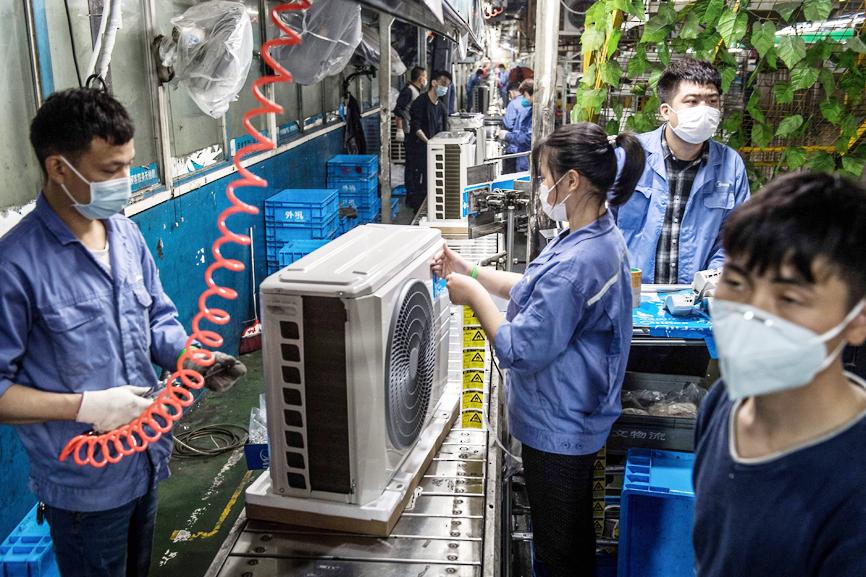Factory activity last month contracted sharply across most of Asia as the COVID-19 pandemic paralyzed economic activity across the globe, with sharp falls in export power houses Japan and South Korea overshadowing a modest improvement in China.
Manufacturing gauges also tumbled in Indonesia, Vietnam and the Philippines, according to various purchasing managers’ index (PMI) surveys released yesterday, underscoring the widening damage brought by the pandemic that has infected more than 873,000 people, upended supply chains and led to city lockdowns worldwide.
RISE IN CHINA

Photo: AFP
China’s Caixin/Markit manufacturing PMI rose to 50.1 from February’s record low of 40.3, and just a notch above the 50-mark that separates growth from contraction, but growth was marginal, highlighting the intense pressure facing businesses as domestic and export demand slumps.
South Korea’s IHS Markit PMI plunged to 44.2, its lowest since January 2009, as many of its trading partners imposed dramatic measures to curb the virus’ spread. The index was 48.7 in February.
Japan’s PMI fell to a seasonally adjusted 44.8 from a reading of 47.8 in February, its lowest since April 2009, adding to views that the world’s third-largest economy is likely already in recession.
CALL FOR STIMULUS
Japan’s ruling coalition has called on the government to secure a stimulus package worth at least ¥60 trillion (US$553 billion), with ¥20 trillion in direct spending.
Elsewhere in Asia, the pain was felt acutely, with the Philippines dropping to 39.7, the lowest since records began in 2016 and Vietnam slipping to 41.9, while Taiwan’s PMI rose above 50.
“Things are likely to get a lot worse in the months ahead,” Capital Economics Ltd economist Alex Holmes said in a note to clients, adding that the survey period for the PMIs likely did not capture more recent lockdowns such as those in Malaysia and Thailand.
The consultancy expects global GDP to fall by more than 3 percent this year.
Policymakers across the globe, including in Asia, have announced massive monetary and fiscal stimulus measures to try to mitigate the economic fallout from the pandemic, keep cash-starved businesses afloat and save jobs.
However, many measures have been short-gap steps to deal with the immediate damage to corporate funding and shore up banking systems amid worries of a credit crisis.
‘MASSIVE’ SPENDING
The IMF has said the pandemic was already driving the global economy into recession, calling on countries to respond with “very massive” spending to avoid bankruptcies and emerging market debt defaults.

Vincent Wei led fellow Singaporean farmers around an empty Malaysian plot, laying out plans for a greenhouse and rows of leafy vegetables. What he pitched was not just space for crops, but a lifeline for growers struggling to make ends meet in a city-state with high prices and little vacant land. The future agriculture hub is part of a joint special economic zone launched last year by the two neighbors, expected to cost US$123 million and produce 10,000 tonnes of fresh produce annually. It is attracting Singaporean farmers with promises of cheaper land, labor and energy just over the border.

US actor Matthew McConaughey has filed recordings of his image and voice with US patent authorities to protect them from unauthorized usage by artificial intelligence (AI) platforms, a representative said earlier this week. Several video clips and audio recordings were registered by the commercial arm of the Just Keep Livin’ Foundation, a non-profit created by the Oscar-winning actor and his wife, Camila, according to the US Patent and Trademark Office database. Many artists are increasingly concerned about the uncontrolled use of their image via generative AI since the rollout of ChatGPT and other AI-powered tools. Several US states have adopted

KEEPING UP: The acquisition of a cleanroom in Taiwan would enable Micron to increase production in a market where demand continues to outpace supply, a Micron official said Micron Technology Inc has signed a letter of intent to buy a fabrication site in Taiwan from Powerchip Semiconductor Manufacturing Corp (力積電) for US$1.8 billion to expand its production of memory chips. Micron would take control of the P5 site in Miaoli County’s Tongluo Township (銅鑼) and plans to ramp up DRAM production in phases after the transaction closes in the second quarter, the company said in a statement on Saturday. The acquisition includes an existing 12 inch fab cleanroom of 27,871m2 and would further position Micron to address growing global demand for memory solutions, the company said. Micron expects the transaction to

A proposed billionaires’ tax in California has ignited a political uproar in Silicon Valley, with tech titans threatening to leave the state while California Governor Gavin Newsom of the Democratic Party maneuvers to defeat a levy that he fears would lead to an exodus of wealth. A technology mecca, California has more billionaires than any other US state — a few hundred, by some estimates. About half its personal income tax revenue, a financial backbone in the nearly US$350 billion budget, comes from the top 1 percent of earners. A large healthcare union is attempting to place a proposal before